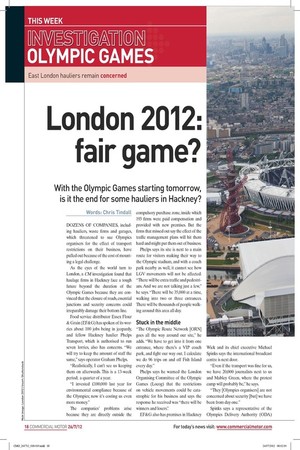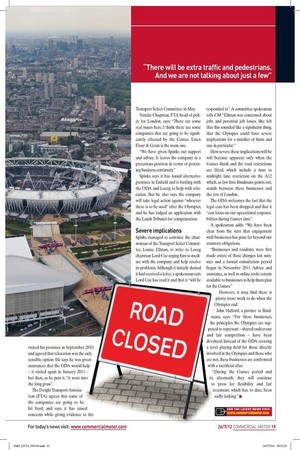London 2012: fair game?
Page 11

Page 12

If you've noticed an error in this article please click here to report it so we can fix it.
With the Olympic Games starting tomorrow, is it the end for some hauliers in Hackney?
Words: Chris Tindall
DOZENS OF COMPANIES, including hauliers, waste irms and garages, which threatened to sue Olympics organisers for the effect of transport restrictions on their business, have pulled out because of the cost of mounting a legal challenge.
As the eyes of the world turn to London, a CM investigation found that haulage irms in Hackney face a tough future beyond the duration of the Olympic Games because they are convinced that the closure of roads, essential junctions and security concerns could irreparably damage their bottom line.
Food service distributor Essex Flour & Grain (EF&G) has spoken of its worries about 100 jobs being in jeopardy, and fellow Hackney haulier Phelps Transport, which is authorised to run seven lorries, also has concerns. “We will try to keep the amount of staff the same,” says operator Graham Phelps.
“Realistically, I can’t see us keeping them on afterwards. This is a 13-week period; a quarter of a year.
“I invested £100,000 last year for environmental compliance because of the Olympics; now it’s costing us even more money.” The companies’ problems arise because they are directly outside the compulsory purchase zone, inside which 193 irms were paid compensation and provided with new premises. But the irms that missed out say the effect of the trafic management plans will hit them hard and might put them out of business.
Phelps says its site is next to a main route for visitors making their way to the Olympic stadium, and with a coach park nearby as well, it cannot see how LGV movements will not be affected. “There will be extra trafic and pedestrians. And we are not talking just a few,” he says. “There will be 35,000 at a time, walking into two or three entrances. There will be thousands of people walking around this area all day.
Stuck in the middle
“The Olympic Route Network [ORN] goes all the way around our site,” he adds. “We have to get into it from one entrance, where there’s a VIP coach park, and ight our way out. I calculate we do 96 trips on and off Fish Island every day.” Phelps says he warned the London Organising Committee of the Olympic Games (Locog) that the restrictions on vehicle movements could be catastrophic for his business and says the response he received was “there will be winners and losers”.
EF&G also has premises in Hackney Wick and its chief executive Michael Spinks says the international broadcast centre is next door.
“Even if the transport was ine for us, we have 20,000 journalists next to us and Mabley Green, where the protest camp will probably be,” he says.
“They [Olympics organisers] are not concerned about security [but] we have been from day one.” Spinks says a representative of the Olympics Delivery Authority (ODA) visited his premises in September 2010 and agreed that relocation was the only sensible option. He says he was given assurances that the ODA would help – it visited again in January 2011 – but then, as he puts it, “it went into the long grass”.
The Freight Transport Association (FTA) agrees that some of the companies are going to be hit hard, and says it has raised concerns while giving evidence to the Transport Select Committee in May.
Natalie Chapman, FTA head of policy for London, says: “There are some real issues here, I think there are some companies that are going to be signiicantly effected by the Games. Essex Flour & Grain is the main one.
“We have given Spinks our support and advice. It leaves the company in a precarious position in terms of procuring business continuity.” Spinks says it has found alternative premises in Enield and is battling with the ODA and Locog to help with relocation. But he also says the company will take legal action against “whoever there is to be sued” after the Olympics, and he has lodged an application with the Lands Tribunal for compensation.
Severe implications
Spinks managed to convince the chairwoman of the Transport Select Committee, Louise Ellman, to write to Locog chairman Lord Coe urging him to mediate with the company and help resolve its problems. Although it initially denied it had received a letter, a spokesman says Lord Coe has read it and that it “will be responded to” . A committee spokesman tells CM: “Ellman was concerned about jobs and potential job losses. She felt that this sounded like a signiicant thing, that the Olympics could have severe implications for a number of irms and one in particular.” How severe these implications will be will become apparent only when the Games inish and the road restrictions are lifted, which include a 6am to midnight lane restriction on the A12 which, as law irm Bindmans points out, stands between these businesses and the rest of London.
The ODA welcomes the fact that the legal case has been dropped and that it “can focus on our operational responsibilities during Games time” .
A spokesman adds: “We have been clear from the start that engagement with businesses has gone far beyond our statutory obligations.
“Businesses and residents were irst made aware of these changes last summer and a formal consultation period began in November 2011. Advice and assistance, as well as online tools, remain available to businesses to help them plan for the Games.” However, it may ind there is plenty more work to do when the Olympics end.
John Halford, a partner at Bindmans, says: “For these businesses, the principles the Olympics are supposed to represent – shared endeavour and fair competition – have been devalued. Instead of the ODA creating a level playing ield for those directly involved in the Olympics and those who are not, these businesses are confronted with a sacriicial altar.
“During the Games period and its aftermath, they will continue to press for lexibility and fair treatment, which has, to date, been sadly lacking.” ■









































